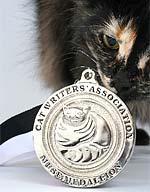 |
|||||||||||||||||||
|
|

We are the proud winners of the 2006 - 2009 winner of the Muse Medallion for Online Magazine by The Cat Writers? Association in their annual Communications Contest! (Photo courtesy of Weems Hutto).
On November 17, 2007 Felinexpress.com was honored to receive The President's Award by the Cat Writers' Association. We are very proud to have earned this distinction and will continue to provide quality information for all cat lovers.
Felinexpress.com Home > Cat Health > My Cat Quit Eating! |
My Cat Quit Eating!
Although more finicky about food than dogs, as a rule, most cats are not picky eaters unless there is a cause. If it is the right diet, cats enjoy their food. They prefer to eat in the company of other cats, although they would rather not share their food bowl. When your cat walks away from his food, there could be several reasons why the food is being rejected. If you notice your cat has walked away from his food bowl:
- Check to see if the sides of the bowl are touching his whiskers. If his whiskers are disturbed while he is eating, he can stop eating.
- Check the expiration date on the food. With their unique sense of smell, cats favor fresh food over stale or spoiled foods.
- In multi-cat homes be sure that you don’t have an alpha cat chasing the others away from the food.
- Have you changed food recently? Diet changes need to be gradual not sudden.
- Is the food heavily dyed? Red colored kibble is a dry food to avoid because of the dye used. The dye is to catch the consumer’s eye; it does not lead to good nutrition for the cat.
- Is he in mourning? Often close feline friends will mourn another’s passing by going off their feed.
- Did he get lost for a few days outside? If so, please get him to the vet quickly for blood work, urine and a complete physical.
- Injuries, collisions with cars, cat bites and other infections will stop a cat from eating, so will a high fever.
- Check his mouth for rodent ulcers, bad teeth or diseased gums. If you see anything abnormal get him to the vet. (Rodent ulcers appear under the tongue).
If your cat stops eating for 48 hours, get him to the vet quickly!
Tips to get your cat to eat:
- Warm the moist cat food slightly. A cat’s prey doesn’t come from a refrigerator. Microwave the food a few seconds making it warm not hot.
- Give your cat a small pinch of organic catnip. Catnip can stimulate an appetite.
- Try hand-feeding but watch your fingers! Or use a plastic spoon in lieu of your fingers.
- Is he obese? Give him a short exercise session right before mealtimes.
- Check the nose for a crusty discharge. Remove any discharge you see with a soft, damp warm cloth. Cats won’t eat if they can’t smell.
- Stimulate his prey response. Use live prey to tempt him to eat; (a beetle safe in a jar) a captured moth, a pet mouse safe in a cage, a gerbil in an exercise ball, something that will motivate him to eat.
- Put a small amount of wet food on his chin or paw and rub it in slightly. He should lick it off.
- Acidophilus capsules- break open the capsule, wet your finger, dip it in the powder, and rub it on the cat’s gum.
- Try different “safe” people food: cream cheese, spray cheese, liverwurst, plain yogurt, cooked chicken (no spices) tuna (use in moderation) salmon, mackerel, sardines, cottage cheese, chicken or meat flavored baby food.
- Add a tiny amount of salt to the wet food, or a pinch of brewer’s yeast or garlic powder.
- Ask your vet for Cyproheptadine, which is an antihistamine, and an appetite stimulant. This needs to be given when you are home to offer the food, because when it kicks in, it works! The cat wants food right away after being given this drug.
When allowed or left to their own devices, cats will eat between ten to eighteen small meals a day, even though they have a simple digestive system that can process large quantities for food in short stints. Feeding your cat small meals several times a day helps them stay involved with eating and prevents the food from spoiling in the room.
If your cat stops eating for 48 hours, don't gamble with his life that he will just start eating on his own. With early veterinary intervention the dangers of the health of the cat with poor or no appetite is essential. Acting promptly to stop any internal damage from occurring and getting effective treatment will enhance your cat's odds of survival.
More cat breeds |
|
? Copyright 2006-2010 Felinexpress.com, All Rights Reserved
Privacy Statement - Disclaimer - About Me


